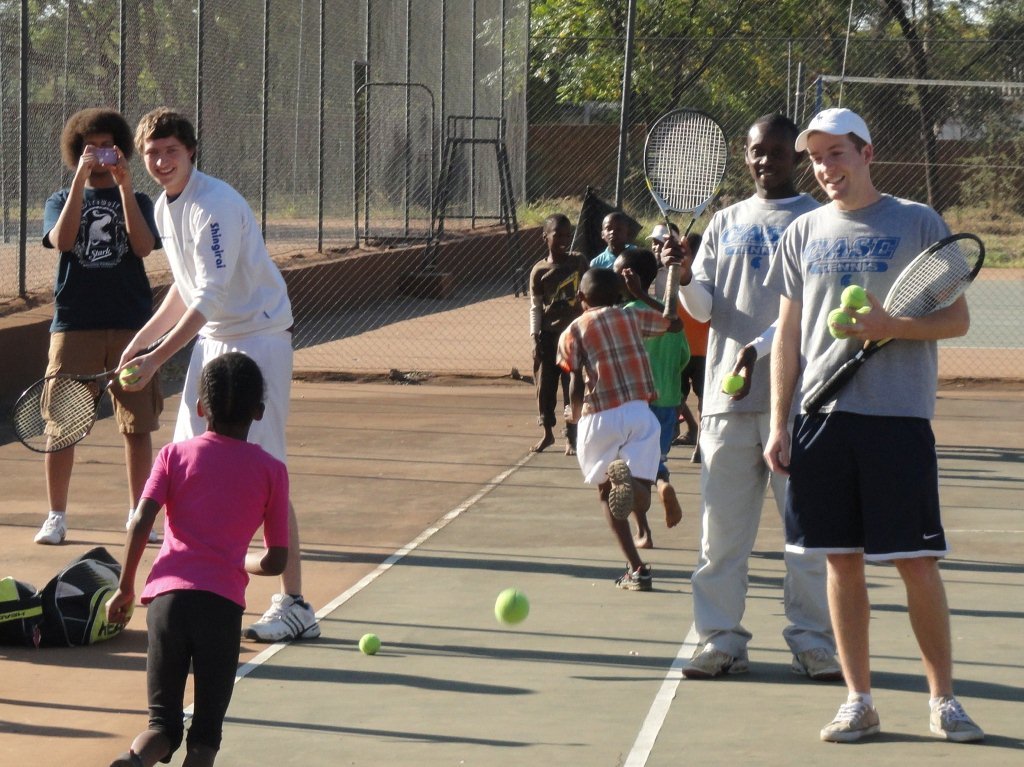 As the school year came to a close, two rising juniors prepared for a three-week trip to Africa to study thermodynamics at the University of Botswana. Once they arrived, they learned plenty about engineering and also helped make the sport of tennis accessible to children in African villages.
As the school year came to a close, two rising juniors prepared for a three-week trip to Africa to study thermodynamics at the University of Botswana. Once they arrived, they learned plenty about engineering and also helped make the sport of tennis accessible to children in African villages.
Biomedical engineering students Ben McClarren and Dan Hageman joined a group of 24 Case Western Reserve University students in the Republic of Botswana, where they took the class “Thermodynamics, Fluid Dynamics, Heat and Mass Transfer,” taught by chemical engineering faculty members Daniel Lacks and Mohan Sankaran.
About a week before departure, Lacks, an avid tennis player, suggested to McClarren and Hageman that they bring along a few tennis racquets along so they could play tennis while there and then donate the racquets at the end of their trip.
McClarren, a member of the Spartan men’s tennis team, and Hageman, who played tennis throughout high school, jumped at the chance—and completely exceeded Lacks’ expectations: With just a week’s notice, they held a donation drive, to which members of the tennis team gave their old equipment and head coach Todd Wojtkowski donated T-shirts, tennis balls and racquets. Their efforts collected more than 75 racquets, 150 balls and a tennis net.
“While the racquets might be considered junk sitting in people’s basements here in the U.S., they are valuable items in a country where 50 percent of the people earn less than $2 per day,” Lacks said. “Many of the racquets were high-end $200 racquets just a few years ago, before new models came out to supplant them.”

Once they arrived in Botswana, the two students connected with Botswana’s Davis Cup player Shingi Muzondiwa. Hageman, McClarren and Muzondiwa traveled to the village of Lobatse, where they brought racquets and led a clinic for children.
As tennis is a relatively unknown sport in Botswana, the children were unfamiliar with Muzondiwa, the country’s top player. But for Hageman and McClarren, meeting him was a “humbling experience.”
Both had the opportunity to play with Muzondiwa as well as other top tennis players in Botswana, including members of the women’s national team. This practice allowed McClarren to get in some off-season training with skilled tennis players, while the teaching clinics helped him brush up on the basics.
After their time with Muzondiwa, the next clinic was in the village of Kanye, where McClarren and Hageman gave tennis demonstrations to and hit balls with more than 300 children. Though they both were used to giving tennis clinics in the U.S., the clinics in Botswana provided an experience unlike anything they’ve ever done before, they said.

“With the kids having no experience with tennis, their enthusiasm for the new sport sparked excitement for everyone present,” Hageman said. “Our ‘tennis drills’ were as simple as having the children run toward us to get a high five while dodging balls tossed by the coaches. It sounds simple, but a fun drill such as this is exactly what is needed to spark passion for the sport.”
The children in Kanye were excited to meet McClarren and Hagemen, offering warm, polite welcomes and even performing songs for them. The interactions with the children both on and off the court made the visit to Kanye the most memorable part of the trip, McClarren and Hageman said.
“The kids, staff and parents were way more excited to have us there than I had anticipated,” McClarren noted. “I would’ve been happy to just drop off the racquets at the school knowing that they would be put to good use, but the reception we got from them was incredible, and watching the kids playing, singing and just having a great time in general was something I’ll never forget.”
The tennis portion of the trip ended when they donated a majority of the racquets to the Botswana Tennis Association during a ceremony in the capital city of Gaborone, near the university. The Botswana Tennis Association will distribute the racquets to children around the country who hold an interest in tennis but cannot afford their own racquets.
Mthandazo Sibanda, head coach of the Botswana Davis Cup team and director of junior development with the Botswana Tennis Association, said the racquets “will go a long way in the development of tennis in Botswana.”
Davis Cup player Muzondiwa agreed. “Sixty racquets will mean 60 new chances of getting professional players from Botswana. It will mean 60 kids doing good as compared to evil. It will mean 60 new people are born into the game’s etiquette,” he said.
Though their trip is now over—they arrived back in the U.S. June 4—Hageman said he and McClarren are interested in developing a program for Case Western Reserve students to get involved with the Botswana Tennis Association in the future.
“With all that was done a week before departure, there’s no telling what the potential of something like this would be with further planning and organization,” he said.
